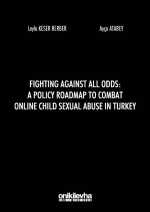 Child abuse is a hideous crime that is combatted against on a global scale. Despite current efforts, unfortunately, this crime still has not been eradicated in either online or offline environments. Critical success factors in the fight against child abuse in a digital environment involve a well-prepared policy roadmap and its effective implementation. With children's increasing involvement in online environments and the growing prevalence of developing technologies, effective fighting methods against online child abuse should be equally fierce in their evolution to increase their protectiveness while keeping up with such changes. Although Turkey has taken considerable steps and has explicitly shown efforts to ensure their protection against abuse, in actual fact, there is still much to do in order to achieve these aspirations in practice. The efficiency of existing laws and current efforts are proven to be insufficient to ensure the desired protections for children against online abuse. This book aims to contribute to filling the gap that exists between theory and practice in Turkey for enhanced child protection, by underscoring the importance of taking the necessary measures to flesh out the goals that are stated in current public policies. The main objective of this book is to point out today's shortcomings and stress that all stakeholders should take the necessary steps and collaborate to improve the current system. The recommendations we make would not only be beneficial to create an effective fighting system truly seeking to protect children against online sexual abuse, but it would also help shape a healthier society in the future by protecting today's children tomorrow's society.(ARKA KAPAKTAN)
Child abuse is a hideous crime that is combatted against on a global scale. Despite current efforts, unfortunately, this crime still has not been eradicated in either online or offline environments. Critical success factors in the fight against child abuse in a digital environment involve a well-prepared policy roadmap and its effective implementation. With children's increasing involvement in online environments and the growing prevalence of developing technologies, effective fighting methods against online child abuse should be equally fierce in their evolution to increase their protectiveness while keeping up with such changes. Although Turkey has taken considerable steps and has explicitly shown efforts to ensure their protection against abuse, in actual fact, there is still much to do in order to achieve these aspirations in practice. The efficiency of existing laws and current efforts are proven to be insufficient to ensure the desired protections for children against online abuse. This book aims to contribute to filling the gap that exists between theory and practice in Turkey for enhanced child protection, by underscoring the importance of taking the necessary measures to flesh out the goals that are stated in current public policies. The main objective of this book is to point out today's shortcomings and stress that all stakeholders should take the necessary steps and collaborate to improve the current system. The recommendations we make would not only be beneficial to create an effective fighting system truly seeking to protect children against online sexual abuse, but it would also help shape a healthier society in the future by protecting today's children tomorrow's society.(ARKA KAPAKTAN)
Table of Contents
Introduction
Methodology
Scope and Objectives
CHAPTER I
Challenges faced: Understanding and Addressing Online Child Sexual Abuse and Exploitation
1. Terminology and semantics
A. Definition of 'Child' and 'Child Abuse'
B. What is Online Child Sexual Abuse and Exploitation?
2. Different Forms: Online & Offline Intersection
3. The Impact of Online Sexual Abuse on Children
4. Addressing the Issues with the Terminology
CHAPTER II
A Comparative Analysis of National and International Approaches
1. National approaches adopted by different jurisdictions
A. Australia
B. Austria
C. Germany
D. China
E. Netherlands
F. Sweden
G. United Kingdom
H. U.S
2. Supranational and International Approaches
3. Emerging Challenges and Trends
A. Common Challenges and Increasing Concerns
B. COVID-19
C. Blockchain and Trust
CHAPTER III
Combating Against Online Child Abuse in Turkey
1. The Elephant in the Room: Statistics
2. Legal Framework
A. International Legal Instruments
B. National Legislation
C. International conventions/treaties
3. Governments and Intergovernmental Organizations
4. Law Enforcement and Judicial Bodies
5. Non-Governmental Organisations
6. Private Sector
7. Academia
8. The Need to Raise Awareness
Conclusion
Annex: Comparative Table of the Lanzarote Convention and the Turkish Penal Code
Bibliography
